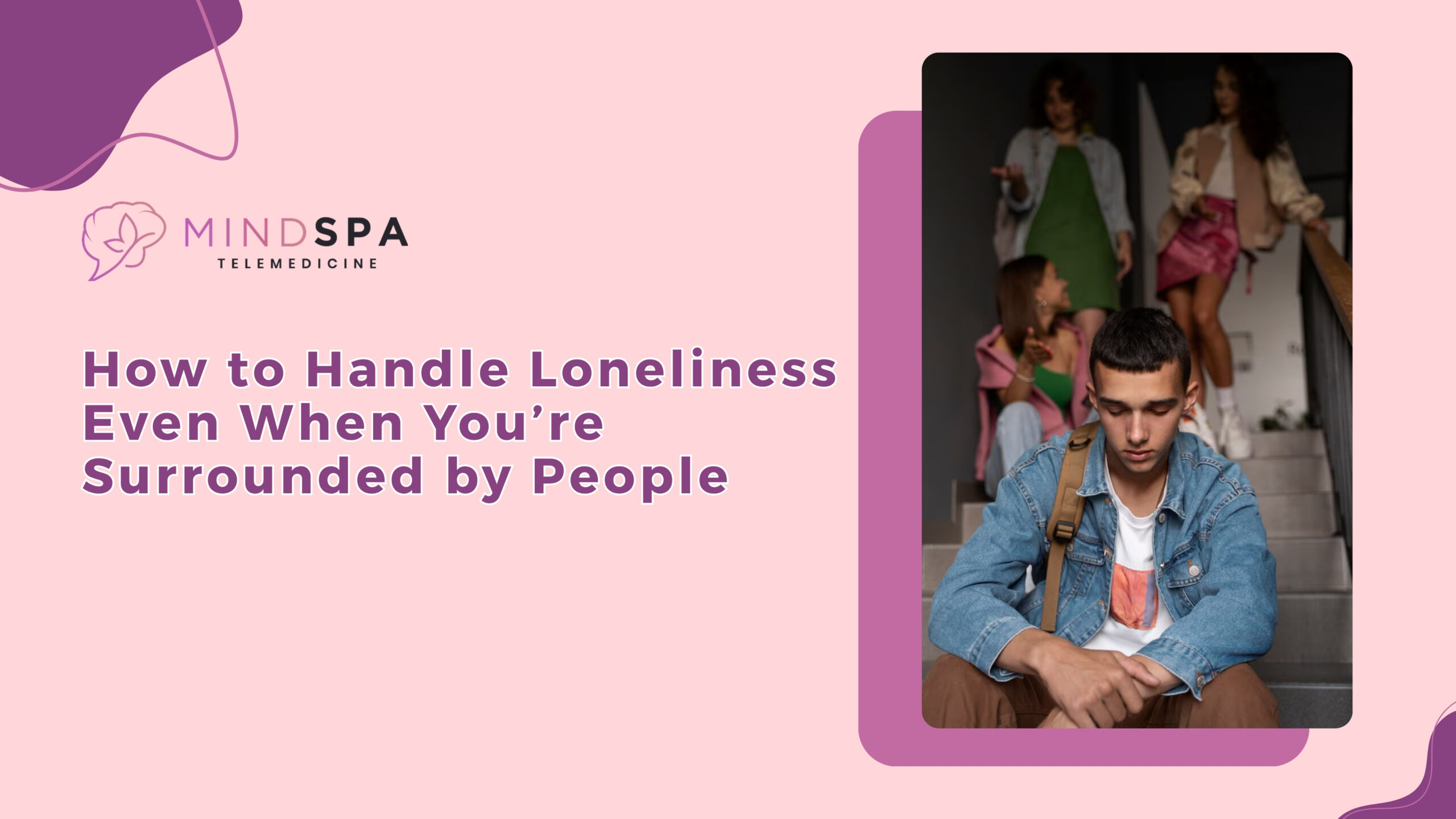Have you ever been in a room full of people, chatting, laughing, and sharing stories, yet felt an overwhelming sense of loneliness? You’re not alone in feeling this way. In our hyper-connected world, where social media and constant communication are the norms, it’s paradoxical that many individuals still grapple with feelings of isolation.
This phenomenon, often referred to as “emotional loneliness,” arises not from a lack of social interaction but from a lack of meaningful connections. It’s the dissonance between being physically present among others and feeling emotionally distant. Understanding this form of loneliness is crucial, as it can have a profound impact on mental and emotional well-being.
In this blog, we’ll explore the reasons behind this paradox and some strategies to navigate and alleviate feelings of loneliness, even when surrounded by people.
Understanding Emotional Loneliness
Emotional loneliness differs from social loneliness. While social loneliness stems from a lack of social interactions, emotional loneliness arises from the absence of deep, meaningful relationships. It’s possible to have a vast social network yet feel emotionally isolated. This form of loneliness is often linked to feelings of being misunderstood, unseen, or unheard, even by those closest to us.
Research indicates that emotional loneliness can have profound effects on mental health. A study published in Neurology found that loneliness can triple the risk of developing dementia. Additionally, the health risks of chronic loneliness are akin to smoking 15 cigarettes a day, highlighting its severity.
Strategies to Combat Emotional Loneliness
Overcoming emotional loneliness, even when surrounded by people, requires more than just being social. It’s about making intentional, authentic connections and addressing underlying emotional needs. Here are some powerful strategies to help you combat this kind of loneliness and build a greater sense of connection and belonging.
1. Cultivate Deep, Meaningful Relationships
It’s possible to be in a room full of people and still feel alone. This usually happens when the relationships in our lives lack emotional depth. Instead of focusing on quantity, shift your energy toward quality. Nurture relationships that allow you to be vulnerable, authentic, and emotionally expressive.
Start by identifying one or two people in your life with whom you feel safe. Make time to deepen those bonds through open conversations, shared experiences, and emotional honesty. Ask thoughtful questions, share your fears, and express appreciation. Remember that emotional intimacy doesn’t happen overnight; it grows through consistency, trust, and empathy.
Set up a regular catch-up with someone close to you, and make space in those conversations for deeper topics beyond surface-level small talk.
2. Limit Social Media and Digital Distractions
Although social media connects us virtually, it can increase emotional loneliness. Constantly seeing highlight reels of other people’s lives can distort reality and make you feel like you’re the only one struggling. According to a study, cutting social media use can significantly decrease loneliness and depression levels among participants.
Reduce your time online and replace it with more meaningful interactions. This could include in-person conversations, voice calls, or even writing letters. Be mindful of how social media makes you feel, and don’t be afraid to unfollow accounts that affect your self-worth or emotional state.
Try creating “tech-free” times each day (e.g., during meals or before bed) to reconnect with yourself and those around you.
3. Join Group Activities That Reflect Your Interests
Shared interests provide an excellent foundation for connection. When you participate in activities you genuinely enjoy, such as a book club, art class, hiking group, or cooking workshop, you’re more likely to meet people with whom you can form genuine bonds.
Group activities offer a sense of belonging and shared purpose, which are critical to emotional well-being. They also allow for organic conversations and gradual relationship-building, which may feel more comfortable than forced socializing.
Explore local community centers, interest-based meetups, or virtual classes that align with your hobbies or values.
4. Practice Emotional Vulnerability and Openness
A major reason emotional loneliness persists is the fear of being vulnerable. Many people erect emotional walls to protect themselves, but this often backfires, leaving them feeling even more disconnected. Being open about your thoughts, fears, and feelings allows others to do the same, creating a deeper emotional bond.
While vulnerability can be scary, it’s also incredibly freeing. Start small. You don’t have to share everything at once, but even saying, “I’ve been feeling a little disconnected lately,” can open the door to meaningful dialogue.
Practice vulnerability with someone you trust. You might be surprised at how much stronger your relationship becomes.
5. Seek Professional Mental Health Support
If emotional loneliness becomes persistent or overwhelming, therapy can be a powerful tool. Therapists help uncover the root causes of loneliness, such as unresolved trauma, social anxiety, low self-esteem, or past relational wounds, and provide tools to work through them.
Individuals seeking therapy for emotional issues usually witness noticeable improvement in their relationships and overall mental health. Therapy can help you identify unhelpful patterns, enhance your communication skills, and rebuild your self-worth.
If you’re unsure where to begin, MindSpa Psychiatry & Therapy makes it easy to access licensed therapists online from the comfort of your home.
6. Strengthen Your Relationship With Yourself
Feeling lonely often stems from feeling disconnected from yourself. Strengthening your self-awareness and self-relationship is a crucial step in overcoming emotional loneliness. Spend time alone doing things that enrich you, like journaling, reading, meditating, or creating art.
When you build a stronger inner world, external relationships often become more meaningful. You stop depending entirely on others for validation and instead approach relationships with confidence and intention.
Start a daily journaling habit where you reflect on your emotions, values, and what connection means to you.

7. Practice Self-Compassion and Mindfulness
Loneliness can trigger self-critical thoughts: “Why am I like this?” or “What’s wrong with me?” These internal narratives can deepen the pain and make you withdraw further. Practicing self-compassion means replacing judgment with kindness and recognizing that everyone struggles with loneliness at some point.
Mindfulness techniques such as deep breathing, body scans, or guided meditation can also help regulate your emotions and bring awareness to how you’re feeling in the present moment, without harsh self-judgment.
When loneliness hits, speak to yourself as you would a dear friend: “This is hard, but it doesn’t mean I’m unlovable. I deserve a connection, and I’m taking steps to find it.”
Recognizing When to Seek Help
It’s essential to recognize when feelings of loneliness become overwhelming. If you find that these feelings persist and impact your daily functioning, it may be time to seek professional assistance. Mental health professionals can offer support and strategies tailored to your unique situation.
Conclusion
Feeling lonely, even when surrounded by people, is a common experience in today’s society. By understanding the nature of emotional loneliness and implementing strategies to foster genuine connections, it’s possible to navigate and alleviate these feelings.
Remember, seeking help is a sign of strength, not weakness. At MindSpa Psychiatry & Therapy, we’re committed to supporting your mental well-being. If you’re grappling with feelings of loneliness or seeking guidance on building meaningful connections, our team of professionals is here to help. Book an appointment today and take the first step toward a more connected and fulfilling life.
Frequently Asked Questions
Can I feel lonely even with friends and family around?
Yes. Emotional loneliness often stems from a lack of deep, meaningful connection, not physical presence.
Is it normal to feel this way?
Absolutely. Many people experience emotional loneliness at some point in life.
Will therapy really help with loneliness?
Yes. Therapy can uncover root causes and equip you with tools to build genuine connections.

